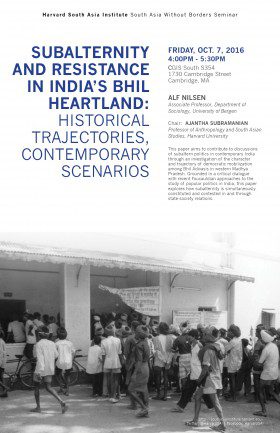South Asia Without Borders Seminar
Alf Nilsen, Associate Professor, Department of Sociology, University of Bergen
Chair: Ajantha Subramanian, Professor of Anthropology and South Asian Studies, Harvard University
This paper aims to contribute to discussions of subaltern politics in contemporary India through an investigation of the character and trajectory of democratic mobilisation among Bhil Adivasis in western Madhya Pradesh. Grounded in a critical dialogue with recent Foucauldian approaches to the study of popular politics in India, this paper explores how subalternity is simultaneously constituted and contested in and through state-society relations. The first part of the paper outlines the contours of contemporary Adivasi subalternity in the Bhil heartland of western India, focusing in particular on the “everyday tyranny” of the local state. I then show how the historical origins of Bhil political subalternity can be traced to the restructuring of sovereignty that occurred across the tribal heartland of western India under as a result of colonial state-making projects that unfolded from the end of the Anglo-Maratha wars onwards, and how the power relations that were constituted in this process were reproduced in western Madhya Pradesh after independence. The third and final part of the paper analyzes the ways in which Bhil social movements in the region mobilized to democratize local state-society relations in the 1980s and 1990s. I read this resistance as revolving around forms of legalism from below which produced the rudiments of a civil society and an insurgent form of citizenship centred on collective resource control and self-determination. In conclusion, I reflect on what conceptual lessons the trajectories of these movements hold for the study of subalterity, resistance, and state-society relations in India today.

